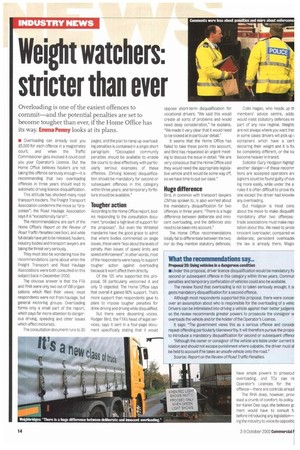Weight watchers: stricter than ever
Page 14

If you've noticed an error in this article please click here to report it so we can fix it.
Overloading is one of the easiest offences to commit—and the potential penalties are set to become tougher than ever, if the Home Office has its way. Emma Penny looks at its plans.
Iv Overloading can already cost you 25,000 for each offence in a magistrates court; and when the Traffic Commissioner gets involved it could cost you your Operator's Licence. But the Home Office believes hauliers are not taking this offence seriously enough—it is recommending that two overloading offences in three years should lead to automatic driving licence disqualification.
This attitude has shocked many road transport insiders. The Freight Transport Association condemns the move as "draconian"; the Road Haulage Association says it is "exceptionally harsh".
The recommendations are part of the Home Office's Report on the Review of Road Traffic Penalties (see box), and while full details have yet to be released, hauliers, Industry bodies and transport lawyers are taking the threat very seriously They must also be wondering how the recommendations came about when the Freight Transport and Road Haulage Associations were both consulted on this subject back in December 2000.
The obvious answer is that the FTA and RHA were only two out of 138 organisations which filed their views; most respondents were not from haulage, but general motoring groups. Overloading forms only a small part of the report, which pays far more attention to dangerous driving, speeding and other issues which affect motorists.
The consultation document runs to 30 pages, and the plan to ramp up overloading penalties is contained in a single short paragraph: "Decoupled community penalties should be available to enable the courts to deal effectively with particularly serious examples of these offences. [Driving licence) disqualification should be mandatory for second or subsequent offences in this category within three years; and temporary forfeiture should be available."
Tougher action
According to the Home Office report, bodies responding to the consultation document "provided a high level of support for the proposals". But even the Whitehall mandarins have the good grace to admit that where bodies commented on single issues, these were "less about the levels of penalty than issues of speed limits and speed enforcement". In other words, most of the respondents were happy to support tougher action against overloading because it won't affect them directly Of the 125 who supported this proposal, 59 particularly welcomed it and only 13 objected. The Home Office says that overall it gained 90% support, That's more support than respondents gave to plans to impose tougher penalties for drink-driving and driving while disqualified.
But there were dissenting voices. Rodger Bird, the ETA's head of legal services, says it sent in a four-page document specifically stating that it would oppose short-term disqualification for vocational drivers. 'We said this would create all sorts of problems and would need deep consideration,' he explains. "We made it very clear that it would need to be looked at in particular detail."
It seems that the Home Office has failed to take these points into account, and Bird has requested an urgent meeting to discuss the issue in detail: 'We are very conscious that the Home Office said they would need the appropriate legislative vehicle and it would be some way off, so we have time to put our case."
Huge difference
Bird, in common with transport lawyers CM has spoken to, is also worried about the mandatory disqualification for two offences in three years: "There is a huge difference between deliberate and innocent overloading, and the defences also need to be taken into account."
The Home Office recommendations totally fail to differentiate between the two; nor do they mention statutory defences. Colin Hagan, who heads up th members' advice centre, adds would insist statutory defences m part of any new regime. Weight( are not always where you want ther in some cases drivers will pick up containers which have a cart declaring their weight and it is fol be completely different, or the loz become heavier in transit.
Solicitor Gary Hodgson highligh another danger—if these recomrr tions are accepted operators am signors could be found guilty of ove ing more easily, while under the a rules it is often difficult to prove thE one except the driver had knowlei any overloading.
But Hodgson is most conc about the move to make disqualifil mandatory after two offences: trade associations must make repr tation about this. We need to prote innocent overloader, compared wi deliberate, persistent overloadel the law is already there. Magis have ample powers to prosecut overloading, and TCs can re Operator's Licences for the offence—there are controls alread The RHA does, however, provi least a crumb of comfort; its policy 1 tor Karen Dee says she believes gc ment would have to consult ft before introducing any legislationing the industry to voice its oppositi




























































































































































